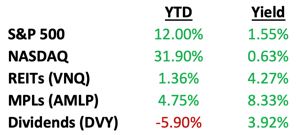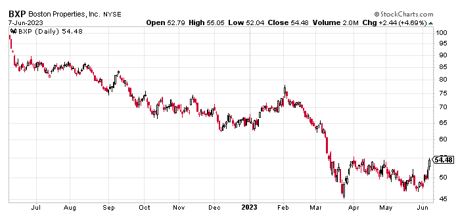
Commercial real estate was one of the safest income investments.
This was especially true of blue-chip office towers in America’s biggest cities – like New York, Chicago, San Francisco and Los Angeles.
Until the pandemic.
It’s crushed the prices of real estate stocks. And dividends are now at risk of getting cut.

Why Income Investors Love Real Estate
Real Estate Investment Trusts – also known simply as REITs – have been a popular way for individual investors to invest in real estate.
REITs trade on the NYSE or Nasdaq just like a regular stock. Each REIT typically owns dozens of properties in a variety of markets.
In addition to office space REITs – you can find REITs with a focus on apartments, malls and retail or single-family homes.
The primary benefit of REITs is that they allow investors to quickly and easily get diversified exposure to the real estate market.
Office Real Estate Crashing
Commercial real estate is falling off a cliff.
The pandemic fueled the “work from home” movement. And 3 years later – most offices struggle to get their employees in the office 5 days a week.
The average office vacancy rate is now at 18.6% – setting a new record.
However, that doesn’t tell the full story. That’s because vacancy rates reflect the amount of office space that is NOT rented.
Office occupancy rates show how much office space is actually being used. That number is just 50% of early 2020 levels in the 10 biggest U.S. cities.
This means that 50% of office space is not being used.
Corporate America is responding.
A commercial real estate firm called CBRE recently surveyed 200 executives of companies with more than 10,000 employees. And two-thirds of these companies plan to reduce their office space within the next two years.
As leases expire – companies are downsizing their space. That means vacancy rates will continue to rise. And that means office buildings will continue to earn less rental income.
Commercial real estate is typically a pretty illiquid market. For example, there aren’t office towers being bought and sold every day in the major markets.
Yet we’re starting to see the market rolling over:
- San Francisco: 13 story office building sells for $45 million – a 50% discount from its purchase price in 2005. That was 85% below the property’s $300 million value just 4-years ago.
- New York City: NYU and Columbia researchers predict that the NYC office buildings will lose 44% of their value.
- Orange County California: Blackstone is selling a 560k square foot office building for 36% below its purchase price in 2014
Office vacancies in places like New York and San Fran are far above the national averages. When buildings are 25% or 50% vacant – cash flows dry up. In many cases the rental income simply isn’t enough to cover the mortgage on the property.
In those types of situations, the owner may simply hand the building keys back to the bank. And the bank will then liquidate the property at any price.
What This Means for REIT Investors
The real estate meltdown is bad news for investors in office REITs.
The Vanguard Real Estate ETF (NYSE: VNQ) is a diversified ETF of REITs – and it’s down 14% in the last year.
Office REITs are faring far worse.
Boston Properties (NYSE: BXP) is one of the biggest – with a focus on office properties in Boston, New York, San Francisco and Washington D.C. Shares are down 47% in the last year.

Boston Properties is currently offering a high yield of 7.5%.
Thus far the REIT has maintained its quarterly dividend. However, that could change if vacancies continue to rise.
A word of warning: don’t be fooled by high yields on REITs. These dividend payments could be at risk of future cuts.
Falling dividends could be the next shoe to drop on office REITs.
Office REITs will turn around. However, it’ll require workers returning to the office – with occupancy rates normalizing. And vacancy rates returning to normal levels.
Until then – it’s hard to get excited about office REITs.
REITs focused on single family houses, apartment buildings, datacenters and warehouses are likely better bets. Stay tuned for more ideas on the best REITs for safe income and capital gains.
 Facebook
Facebook
 Twitter
Twitter